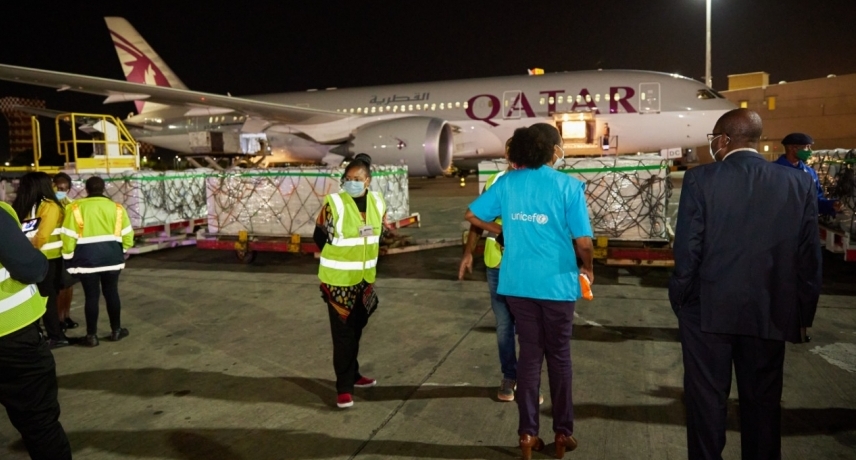KAA plans to make air cargo a pillar of Kenyan economy
Kenya Airports Authority is aiming to position its airports as a network of regional hub for cargo movements in east Africa.

Kenya Airports Authority is aiming to position its airports as a network of regional hub for cargo movements in east Africa. KAA’s cargo plans include aggressive marketing, embracing PPP investments concepts for cargo facilities, promoting international e-commerce shipments and building partnerships with stakeholders in the pharmaceutical supply chain.
The Kenya Airports Authority (KAA) is the autonomous owner and operator of all airports in Kenya. It manages four international airports, five domestic airports and nine airstrips across the country. In other words, it is the sole authority and air transport gateway for the East African nation.
According to the Air Trade Facilitation Index (ATFI) by International Air Transport Association (IATA), Kenya’s facilitation of air cargo through its customs’ and borders’ regulations ranks 69th out of 124 countries and 46th out of 135 countries in terms of the eFreight Friendliness Index (EFFI) globally. The Enabling Trade Index (ETI) ranks Kenya 77th out of 136 countries globally for the facilitation of the free flow of goods over borders and to its destination.
This shows how much Kenya has to improve in its air trade facilitation to become the real regional hub for air cargo. Meanwhile, KAA is moving forward, with the help of the government, to help exporters and importers in the country move their goods to international destinations with ease. Even though Kenya is already a maritime power in the region, the country also needs a strong air transport mechanism due to the type of commodities it has to export and import, which include perishables and temperature- sensitive goods.
Jimmy Kibati, general manager-marketing and business development, Kenya Airports Authority, said, “Cargo operations constitute a vital segment of activities undertaken in our airports. In general, cargo operations vary from airport to airport depending on its size and volumes of freight handled. The cardinal objective of air cargo activities at JKIA is to provide support and strengthen operations of the transit sheds, specialized freight area (SFA) operations, courier services, cargo airlines, animal holding services, ramp handling, clearing and forwarding companies all of whom play a key role in the freight export/import processes.”
About the important commodities handled at Kenyan airports, he said, “Exports mostly include flowers, vegetables, fruits, meat, fish, live animals etc, while commodities imported include general cargo, pharma, live animals etc.”
JKIA
Jomo Kenyatta International Airport (JKIA) in the capital city of Nairobi is the most important and strategic airport operated by KAA. JKIA is not only the biggest airport in Kenya but also the one with the biggest capacity in the East African region. Both the government of Kenya and KAA want JKIA to become the cargo hub for the region by allowing more airlines to connect it to the world.
Kibati informed, “We have six state-of-the-art cargo transit sheds with a total space of 51,405.81 square metres and a capacity to handle cargo amounting to 1.350 million tonnes. The cargo apron/ramp has been expanded to accommodate eight wide-bodied cargo aircraft at any given time. We are also providing adequate loading/offloading bays for imports and exports. We provide animal holding facility for handling live animals and animal products. We have deployed modern security systems for screening air cargo and safety procedures in line with ICAO/IATA standards. For consolidation of fresh produce/flowers, we have dedicated specialised freight area strategically positioned for easy access to cargo terminals.”
Cargo facilities across the International Airports of Kenya Airports Authority have many on-going development and modernisation projects.
Jimmy Kibati, Kenya Airports Authority
He also noted that cargo facilities across the International Airports of Kenya Airports Authority have many on-going development and modernisation projects.
International trade
While there are many fighting against it, on March 9, 2021, Kenyan Parliament ratified the Kenya-UK trade deal for a duty-free trade-economic framework between the two countries. This trade agreement will ensure that all companies operating in Kenya can benefit from duty-free access to the UK market.
According to the UK government, the top goods imports to the UK from Kenya in 2019 were in tea, coffee and spices (£121 million); vegetables (£79 million); and live trees and plants, mostly flowers (£54 million).
“The UK market accounts for 43 percent of total exports of vegetables from Kenya as well as at least 9 percent of cut flowers, and this agreement will support Kenyans working in these sectors by maintaining tariff-free market access to the UK. It will also benefit many of the approximately 2,500 UK businesses exporting goods to Kenya each year, including many UK suppliers of machinery, electronics and technical equipment, where continued tariff-free access will be guaranteed,” says the UK government release.
Due to the high-value commodities involved, the trade flow on both sides will require tremendous support from Kenyan airports and their capabilities to handle goods.
KAA cargo plans
Regarding the recent initiatives by KAA to promote cargo operations, Kibati listed the priorities as aggressive marketing of its International Airports to global strategic partners and sensitising cargo stakeholders on new markets e.g. Middle East, Far East and Australia along with robust cargo infrastructure development, public-private partnership engagement, cargo business automation and cargo customer service focus.
Due to the high-value commodities involved, the trade flow on both sides will require tremendous support from Kenyan airports and their capabilities to handle goods.
For example, KAA in early March 2021 announced its plan to upgrade Kisumu International Airport, situated on the shores of Lake Victoria, by April next year for Sh1.2 billion. It has already leased land to a private developer to set up a cargo-handling unit, as reported by Kenya News Agency. Recently, governors of the North Rift Economic bloc and the Kenyan Fresh Produce Consortium has backed the plans to make North Rift based Eldoret International Airport an export hub for the regional and international market, as reported by The Star.
Kibati has urged exporters in the East African region to come to the strategically positioned airports managed by KAA and explore the benefits. He added, “Our airports have scheduled cargo airlines network (connectivity), adequate and modern cargo infrastructure to handle different types of export cargo, offer competitive freight charges compared to counterparts and modern security screening systems for air cargo.
About its plan to develop the cargo business and position itself as the hub, Kibati said, “We want to position cargo business as a pillar of the national economy by aggressively marketing JKIA globally as the Africa/regional logistics hub, embracing PPP (public-private partnership) investments concept for cargo facilities, establish and promote e-commerce at JKIA and our international airports, partner with stakeholders on pharma market on specialised deliveries and develop a free trade zone for consolidation and distribution of cargo.”
Covid-19 vaccines
Handling the Covid-19 vaccines is the next adventure that not only Kenya but also all African nations are preparing for. Due to the strict temperature requirement necessary for all vaccines, the airports along with their stakeholders need robust infrastructure and handling facilities to avoid any potential wastage, which the region cannot afford.
During the recent Vaccine Logistics Virtual Summit under the title ‘Is Africa prepared to get the Covid-19 jab?’ organised by Logistics Update Africa, Evans Michoma, marketing officer-cargo, KAA, said, “We are very much prepared in terms of cold rooms. Considering the fragility of the Covid-19 vaccines, the space to handle them is already available in JKIA. Our cargo transit shed operators are more than prepared to handle the vaccines. The infrastructure is in place. Our local carriers i.e. Kenya Airways and Astral Aviation are ready to distribute the vaccines in the region from the Nairobi hub. The government, through the ministry of health, is very supportive to come together as a country, as airport operator and as stakeholders in the aviation industry to provide necessary infrastructure and equipment to carry vaccines.”


